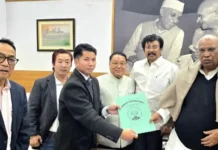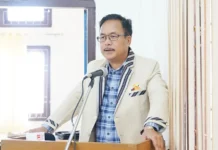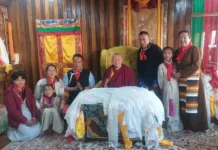[ Sachin Rana ]
An appalling act rocked the streets of the national capital when two young women hailing from one of the northeastern states were openly outraged by a few middle-aged men in Hauz Khas area in Delhi. The video, which may have been shot by one of the victims, has gone viral and it clearly indicates the racial discrimination the people from this part of our country face when they visit or reside in other parts of the country.
In the current case, the Delhi Commission for Women has taken suo moto cognizance and sought a detailed report from the Delhi Police. However, it is also true that, be it the national capital Delhi or any other city, such as Mumbai, Bengaluru, or Chennai, discrimination against the people hailing from the northeastern states is being reported regularly by the media.
After the unfortunate death of Nido Tania, a student from Arunachal Pradesh, a committee was formed in 2014 under the chairmanship of retired IAS officer MP Bezbaruah to look into the various concerns of the people hailing from the northeastern states of India who are living in other different parts of the country. The committee scrupulously studied the issues and offered its recommendations for prioritized implementation in the immediate term, the short term and the long term. Many of the recommendations have been implemented over time, yet a few of them are yet pending, such as amending Section 153 of the Indian Penal Code (IPC) of 1860 and educating the people about the Northeast. The latter may be correlated to the recent bitter episode of a YouTuber, wherein he dares to openly malign one of the people’s representatives of our state.
In the times of the Covid-19 pandemic, the Indian Council of Social Science Research (ICSSR) conducted a research on racial discrimination and hate crimes against people from the Northeast states, and the study concluded that “Northeast India seamlessly fits Indian’s imagination of a Chinese person.” The study found that 78 percent of the people from the region who were interviewed believed that physical appearance was the most important reason for prejudice against them. The study said that, amid the Covid-19 outbreak, people from the region “faced an increased number of acts of hate and prejudices against them.” A series of attacks were reported in various parts of the country where people from the region were “harassed, abused, and traumatized” and were disparagingly called ‘coronavirus’, the study said.
Further, the study revealed that the hate crimes and racial discrimination against people from the Northeast are deep-rooted even in the cosmopolitan cities. Most of them faced problems while renting a house, even in restaurants they faced issues, forcing them to eat mostly in eateries run by people from their communities.
As per the study, Mumbai recorded the highest offensive and abusive language-related crimes (74 percent), followed by Chennai (72 percent), Pune (67.3 percent), Delhi (64 percent), Hyderabad (48.7 percent) and Bengaluru (43.3 percent). So the problem is almost everywhere.
For the cases of incessant discrimination in the Delhi nation capital region (NCR), one of the significant recommendations of the MP Bezbaruah Committee saw the daylight when the Special Unit of the Delhi Police for North Eastern Region (SPUNER) was launched in 2014. Now the Delhi Police are aiming to establish one full-fledged office building complex for the SPUNER team in Nanakpura area of Delhi.
The SPUNER will be taking initiative to help and protect northeastern citizens in the Delhi NCR. It is presently headed by an IPS officer from Arunachal Pradesh, Hibu Tamang, who is an additional commissioner of the police in Delhi. It is also not out of place to mention the distress phone helpline 1093, which provides help to persons who have come to Delhi from the northeastern States. The SPUNER can also be contacted on their WhatsApp number 8750870582.
To avoid any miscommunication while sharing a problem/complaint during the conversation, it has been ensured that the SPUNER is manned by persons hailing from the northeastern states as far as possible.
The Supreme Court of India in the Karma Dorji & Others vs Union of India & Others (2014) case made several recommendations for prevention and monitoring of racial hatred and violence, though, as per reports, not much seems to have been done in this regard.
In continuation to the above, observing the growing incidents of racial discrimination and verbal abuse against citizens from the northeastern states, the ministry of home affairs (MHA) has sent letters to all the states and union territories, directing them to book offenders guilty of atrocity against people from the region under the Scheduled Castes and Scheduled Tribes (Prevention of Atrocities) Act, since a significant number of persons from the Northeast belong to the scheduled tribes. Under this law, an offender can end up spending five years in jail and the accused could be denied anticipatory bail as well. And in case the police fail to act on a complaint, he/she could be imprisoned for a term which should not be less than six months and may be extended to a year. However, these issues of discrimination cannot be solved by policing alone; rather, a holistic approach is desirable.
The governments of the northeastern states should meet on this issue, as well, and activate the cells in their respective bhavans to not only provide shelter, relief and rehabilitation facilities to the people of their states in distress but also compulsorily give them tasks, so that they can come out of their isolation. They should be encouraged to interact and engage more with the youths of the other parts of the country. They can call upon and invite various colleges and universities. Mutual cultural programmes and sports events can be a torchbearer in this matter.
The bhavans with their officers must act as a catalyst to provide correct information and the true picture of this beautiful part of the country, so that people from the other states could be made better-informed and hence welcoming towards the people from the northeastern states. The government and other stakeholders should take the responsibility of teaching the country about the history, culture and tradition of this land. (The contributor is an IAS officer serving the Arunachal government.)



